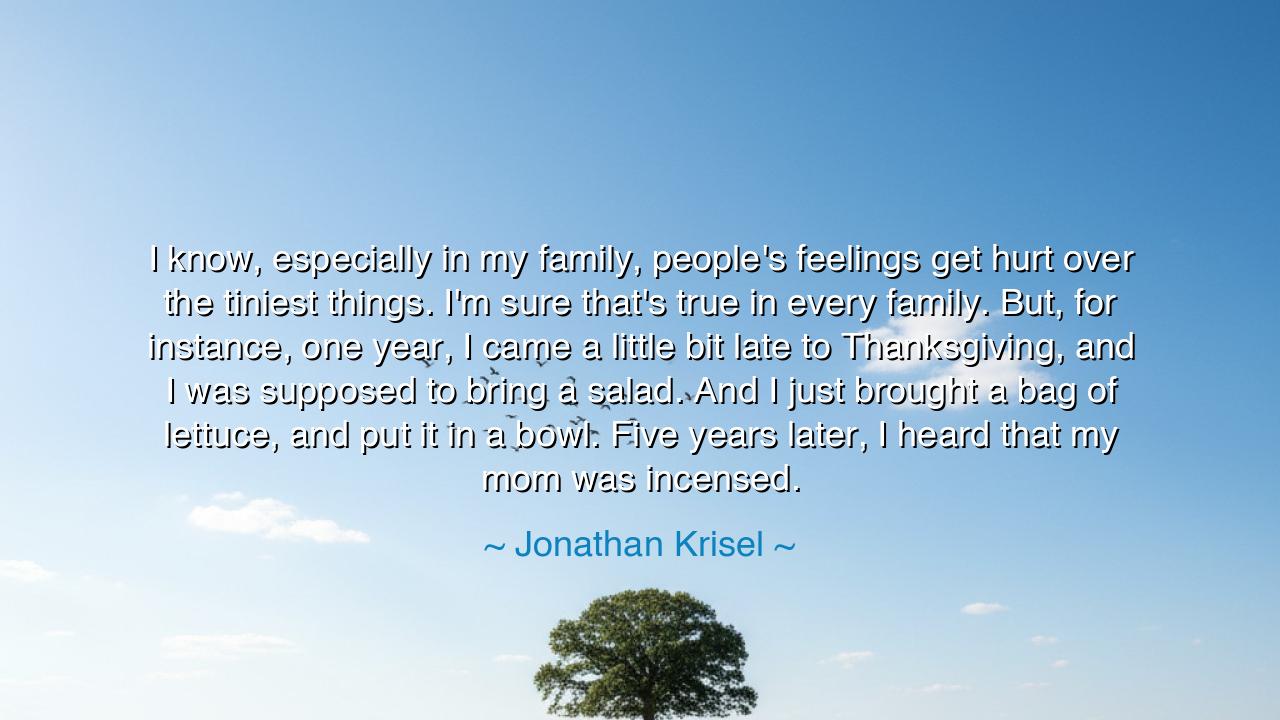
I know, especially in my family, people's feelings get hurt over
I know, especially in my family, people's feelings get hurt over the tiniest things. I'm sure that's true in every family. But, for instance, one year, I came a little bit late to Thanksgiving, and I was supposed to bring a salad. And I just brought a bag of lettuce, and put it in a bowl. Five years later, I heard that my mom was incensed.






In the humorous yet piercing words of Jonathan Krisel, we hear not merely a tale of tardiness and a bag of lettuce, but a truth about the fragile bonds of kinship: “I know, especially in my family, people’s feelings get hurt over the tiniest things. I’m sure that’s true in every family. But, for instance, one year, I came a little bit late to Thanksgiving, and I was supposed to bring a salad. And I just brought a bag of lettuce, and put it in a bowl. Five years later, I heard that my mom was incensed.” What seems a small memory of domestic comedy becomes, when considered deeply, a parable of the human heart and the lasting weight of small actions.
The essence of his reflection is this: in every family, there is both tenderness and tension. The bonds that unite us also make us vulnerable to the sharp edges of expectation and disappointment. A forgotten dish, a late arrival, a careless word—these are small things in themselves, but within the sacred space of Thanksgiving, where meaning is magnified, such acts can wound pride and linger in memory far beyond their moment. What Krisel reveals with laughter, the ancients often spoke with solemnity: that it is not the great betrayals alone, but the tiny fractures of daily life, that test the endurance of human bonds.
Consider the story of Jacob and Esau, brothers bound by blood yet divided by small moments that became great grievances. A bowl of lentils, a blessing given or withheld—these small acts, magnified by pride and memory, became wounds that shaped their destinies. So too in Krisel’s family tale: what was but a bag of lettuce became, in the heart of his mother, a symbol of neglect or indifference, remembered years later as a slight. The lesson is the same: small acts, whether of care or of carelessness, echo long after they are done.
Yet there is also humor and hope in Krisel’s recollection. For by laughing at his own failure, he softens the sting of remembered anger. Humor, like wisdom, allows us to see that the things that divide families are often absurd, and that forgiveness is found not in denying the hurt but in recognizing the folly of clinging to it. In this way, Krisel’s anecdote becomes not only a confession but a teaching: to hold lightly the slights of the past, and to recognize that love is greater than salad.
The teaching runs deeper still. In Thanksgiving, the feast is never about the food alone. It is about the intention, the presence, the devotion shown in the act of gathering. A bag of lettuce in place of a true dish was, in the eyes of his mother, not simply poor cooking but a failure of intention, a sign of not fully honoring the spirit of the gathering. Here lies the true wound: not the absence of vegetables, but the absence of care. Thus, we are reminded that in family life, every offering—whether a dish, a word, or a gesture—carries symbolic weight.
From this, a lesson emerges: in the presence of loved ones, give not the least but the best of yourself. Do not imagine that small acts go unnoticed; they may be cherished or resented long after they occur. A timely arrival, a thoughtful dish, a word spoken with kindness—these are the silent bricks that build or weaken the temple of family. One may think the feast is about the turkey or the pies, but truly, it is about the reverence shown to one another.
Practical wisdom follows. When you gather with your family, remember that every action is a message. Be generous with effort, even in small things. Arrive with thoughtfulness. Prepare your offerings with care. And if you have erred, do not hide from it—acknowledge, laugh, and make amends quickly, so that no five years later bitterness need remain. In this way, you will not only preserve peace but deepen the bonds of love.
Thus, the playful words of Jonathan Krisel carry ancient weight: that in the house of family, even a bag of lettuce can matter. Let us therefore live with care, knowing that our smallest deeds may echo long after the feast is finished, and let us be quick to temper pride with forgiveness, and folly with laughter. For this is how families endure—not through perfection, but through humility, remembrance, and love.






AAdministratorAdministrator
Welcome, honored guests. Please leave a comment, we will respond soon